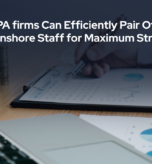In today’s competitive accounting landscape, CPA firms are increasingly turning to offshore staffing solutions to enhance efficiency, reduce costs, and improve service delivery. However, the real challenge lies in seamlessly integrating offshore and onshore teams to maximize their collective potential. When done right, this collaboration can lead to significant operational advantages, increased productivity, and business growth. Let’s explore how CPA firms can efficiently align offshore and onshore staff for maximum strength.
1. Defining Clear Roles and Responsibilities
For an offshore-onshore staffing model to succeed, CPA firms must establish well-defined roles and responsibilities for both teams. Offshore staff should tasks such as bookkeeping, payroll processing, and tax return preparation, while onshore staff should focus on client interactions, advisory services, and strategic decision-making. This clear division ensures that both teams work efficiently without overlapping responsibilities, leading to higher productivity and improved service quality.
Aligning Workflows for Better Results and Efficiency
A structured workflow is essential to ensure offshore and onshore teams work in sync. CPA firms should implement standardized procedures, automation tools, and cloud-based software to streamline processes. Defining task ownership, setting deadlines, and maintaining a centralized document-sharing system help prevent miscommunication and delays, ensuring smooth operations and faster turnaround times.
Creating Performance Metrics and Accountability
Establishing key performance indicators (KPIs) ensures that both offshore and onshore teams stay aligned with business goals. Metrics such as turnaround time, accuracy rates, and client satisfaction should be tracked regularly to measure efficiency. Additionally, assigning dedicated team leads and implementing regular performance reviews can help maintain accountability, improve work quality, and foster a culture of continuous improvement.
2. Leveraging Technology for Seamless Collaboration
In the modern workplace, technology acts as a catalyst for efficiency, allowing teams to collaborate without constraints of time or location. Digital transformation has introduced tools that not only connect people but also streamline operations, improve workflow visibility, and enhance productivity.
- Cloud-Based Collaboration Tools: Google Workspace, Microsoft 365, and Dropbox facilitate real-time file sharing, remote access, and version control.
- AI and Automation in Collaboration: AI-driven task automation and chatbots reduce workload and improve efficiency in managing routine tasks.
- Integration of Project Management Tools: Platforms like Canopy, Asana, and Jira centralize task tracking, deadlines, and responsibilities for smoother execution.
- The Rise of Virtual and Augmented Reality (VR/AR): VR meetings and AR-enhanced training sessions make remote collaboration more immersive and interactive.
3. Establishing Strong Communication Channels
One of the most common challenges in offshore staffing is communication gaps. To overcome this, CPA firms should establish structured communication protocols, including daily or weekly updates, team meetings, and day-end updates. Encouraging an open line of communication fosters transparency, builds trust, and ensures that offshore teams are aligned with the firm’s goals and expectations.
- The Importance of Asynchronous Communication: Tools like Slack, email, and recorded video updates allow teams to collaborate across different time zones without delays.
- Enhancing Real-Time Communication: Video conferencing, instant messaging, and live collaboration tools facilitate quick discussions and real-time decision-making.
- Building a Feedback-Driven Culture: Regular check-ins, surveys, and open-door policies encourage employees to share ideas and concerns freely.
- Effective Internal Knowledge Sharing: Platforms like Notion, Confluence, and internal wikis store essential documents and best practices for easy access.
4. Implementing Standardized Workflows and Training Programs
Consistency in work quality is essential for a smooth offshore-onshore partnership. Firms should implement standardized workflows, detailed operating procedures, and continuous training programs to ensure offshore teams follow the same quality standards as their onshore counterparts. Regular training on industry updates, software tools, and compliance requirements helps offshore staff stay aligned with evolving business needs.
- The Need for Workflow Documentation: Clearly documented SOPs (Standard Operating Procedures) provide a reference for employees and ensure uniformity.
- Adopting Industry Best Practices in Training: Regular training sessions, mentorship programs, and certifications keep employees updated with evolving trends.
- Leveraging Learning Management Systems (LMS): Platforms like Udemy, Coursera for Business, and LinkedIn Learning enable self-paced professional development.
- Onboarding Programs for New Employees: Structured onboarding processes help new hires integrate smoothly into company culture and operations.
5. Fostering a Unified Work Culture
A strong company culture is key to making offshore staff feel like an integral part of the team rather than just Offshore workers. CPA firms should actively involve offshore employees in company meetings, virtual team-building activities, and performance recognition programs. Celebrating small wins, acknowledging contributions, and promoting inclusivity help create a cohesive work environment where both teams feel valued and motivated.
- Encouraging Cross-Team Collaboration: Breaking down silos between departments fosters innovation and enhances teamwork.
- The Role of Leadership in Culture Building: Transparent leadership, active listening, and recognition programs contribute to a positive work environment.
- Diversity, Equity, and Inclusion (DEI) Initiatives: Promoting workplace diversity ensures different perspectives, leading to better decision-making and a more inclusive work environment.
- Work-Life Balance and Employee Well-Being: Offering flexible work arrangements, mental health support, and wellness programs increase job satisfaction.
6. Ensuring Compliance and Data Security
Data security and compliance are critical concerns when working with offshore teams. CPA firms must establish strict security protocols, including access controls, encrypted file transfers, and adherence to industry regulations like GDPR and SOC 2 compliance. Ensuring offshore teams follow these protocols not only protects sensitive client data but also builds trust with clients who may be concerned about outsourcing financial tasks.
- Implementing Strong Data Protection Policies: Encryption, VPNs, and secure file-sharing practices safeguard business-critical data.
- Regulatory Compliance in Digital Workspaces: Adhering to GDPR, HIPAA, SOC 2, and other regulations ensures organizations avoid legal risks.
- Cyber-security Awareness Training for Employees: Educating employees on phishing attacks, password management, and safe online behavior reduces security threats.
- The Role of Zero-Trust Security Models: Implementing zero-trust frameworks ensures continuous authentication and strict access controls.
7. Monitoring Performance and Optimizing Workflows
Regular performance monitoring helps CPA firms measure the effectiveness of their offshore-onshore collaboration. Firms should use key performance indicators (KPIs) such as turnaround time, accuracy rates, and client satisfaction to assess productivity levels. Continuous process improvements and feedback loops ensure that both teams are aligned and working toward the firm’s long-term goals.
- Using Data Analytics for Performance Tracking: Dashboards and KPI monitoring tools provide real-time insights into productivity and workflow efficiency.
- Adopting Agile and Lean Methodologies: Agile sprints and Lean Six Sigma help organizations stay adaptive and minimize waste.
- Employee Performance Reviews and Feedback Loops: Regular performance assessments help employees align with organizational goals and receive constructive feedback.
- Continuous Improvement through Automation: AI-driven process optimization and workflow automation reduce redundancies and enhance output.
Conclusion
By strategically pairing offshore and onshore teams, CPA firms can significantly enhance operational efficiency, reduce costs, and improve service delivery. A well-integrated workforce, supported by technology, clear communication, standardized workflows, and a strong company culture, ensures maximum productivity and long-term business success. Embracing this hybrid staffing model is not just about cost savings—it’s about building a smarter, more resilient CPA firm that is well-equipped to meet the demands of an evolving financial industry.










120 Comments
abrir uma conta na binance
November 24, 2025, at 9:21 AMYour article helped me a lot, is there any more related content? Thanks! https://accounts.binance.com/pt-BR/register-person?ref=GJY4VW8W
Binance推荐
November 27, 2025, at 11:05 PMThank you for your sharing. I am worried that I lack creative ideas. It is your article that makes me full of hope. Thank you. But, I have a question, can you help me?
best binance referral code
November 29, 2025, at 1:54 PMThanks for sharing. I read many of your blog posts, cool, your blog is very good.
бнанс рестраця для США
November 30, 2025, at 2:38 PMCan you be more specific about the content of your article? After reading it, I still have some doubts. Hope you can help me.
binance Empfehlung
November 30, 2025, at 7:25 PMI don’t think the title of your article matches the content lol. Just kidding, mainly because I had some doubts after reading the article. https://www.binance.info/ru/register?ref=O9XES6KU
binance
December 01, 2025, at 4:10 PMCan you be more specific about the content of your article? After reading it, I still have some doubts. Hope you can help me.
binance Препоръчителен код
December 03, 2025, at 6:52 AMThank you for your sharing. I am worried that I lack creative ideas. It is your article that makes me full of hope. Thank you. But, I have a question, can you help me?
create a binance account
December 05, 2025, at 6:52 AMYour article helped me a lot, is there any more related content? Thanks!
binance kod
December 06, 2025, at 12:27 AMI don’t think the title of your article matches the content lol. Just kidding, mainly because I had some doubts after reading the article.
binance
December 07, 2025, at 8:34 AMYour point of view caught my eye and was very interesting. Thanks. I have a question for you.
Referal Binance
December 08, 2025, at 12:27 PMCan you be more specific about the content of your article? After reading it, I still have some doubts. Hope you can help me.
binance registracn'y bonus
December 12, 2025, at 7:22 PMReading your article helped me a lot and I agree with you. But I still have some doubts, can you clarify for me? I’ll keep an eye out for your answers. https://www.binance.com/register?ref=IHJUI7TF
registrera dig f"or binance
December 13, 2025, at 4:14 AMYour point of view caught my eye and was very interesting. Thanks. I have a question for you. https://accounts.binance.com/hu/register?ref=IQY5TET4
Binance代码
December 14, 2025, at 7:32 AMThanks for sharing. I read many of your blog posts, cool, your blog is very good. https://accounts.binance.info/es-AR/register?ref=UT2YTZSU
binance referral
December 18, 2025, at 9:14 PMI don’t think the title of your article matches the content lol. Just kidding, mainly because I had some doubts after reading the article.
bet288
December 22, 2025, at 9:32 AMBet288 is just alright. It’s nothing special but you can definitely find some fun things to do on the site if you’re bored. Check it out for yourself: bet288!
Binance创建账户
December 24, 2025, at 1:09 PMCan you be more specific about the content of your article? After reading it, I still have some doubts. Hope you can help me. https://www.binance.info/register?ref=IHJUI7TF
Registro en Binance
December 26, 2025, at 12:09 AMThanks for sharing. I read many of your blog posts, cool, your blog is very good.
binance
December 28, 2025, at 5:21 AMThank you for your sharing. I am worried that I lack creative ideas. It is your article that makes me full of hope. Thank you. But, I have a question, can you help me? https://www.binance.info/lv/register?ref=SMUBFN5I
binance美國註冊
December 30, 2025, at 10:17 PMThank you for your sharing. I am worried that I lack creative ideas. It is your article that makes me full of hope. Thank you. But, I have a question, can you help me?
binance
January 01, 2026, at 12:12 AMCan you be more specific about the content of your article? After reading it, I still have some doubts. Hope you can help me.
otevrení úctu na binance
January 02, 2026, at 6:02 PMThank you for your sharing. I am worried that I lack creative ideas. It is your article that makes me full of hope. Thank you. But, I have a question, can you help me?
Lumikha ng Binance Account
January 08, 2026, at 5:16 AMThanks for sharing. I read many of your blog posts, cool, your blog is very good.
unlocker
January 10, 2026, at 9:30 AMunlocker.ai – The Ultimate AI Tool for Bypassing Restrictions and Unlocking Content Seamlessly!
binance帳戶創建
January 11, 2026, at 9:19 PMCan you be more specific about the content of your article? After reading it, I still have some doubts. Hope you can help me. https://www.binance.info/es/register?ref=RQUR4BEO
philbet
January 11, 2026, at 11:50 PMhttps://www.philbetts.net I am thanksful for this post!
ph789 login
January 12, 2026, at 5:20 PMhttps://www.ph789-login.com I am thanksful for this post!
pin77 app
January 13, 2026, at 2:15 AMhttps://www.pin77.tech I am thanksful for this post!
打开Binance账户
January 14, 2026, at 9:26 AMYour point of view caught my eye and was very interesting. Thanks. I have a question for you.
okbet15
January 14, 2026, at 1:42 PMokbet15 https://www.okbet15.org
phwin25
January 14, 2026, at 1:48 PMphwin25 https://www.phwin25g.net
okebet3
January 14, 2026, at 1:48 PMokebet3 https://www.okebet3u.org
77jili
January 14, 2026, at 2:02 PM77jili https://www.77jilig.net
vipjili
January 14, 2026, at 2:04 PMvipjili https://www.vipjiliji.com
pagcor
January 14, 2026, at 2:36 PMpagcor https://www.ngpagcor.net
phtaya11
January 14, 2026, at 2:43 PMphtaya11 https://www.phtaya11y.com
jl16login
January 14, 2026, at 2:59 PMjl16login https://www.adjl16login.net
98jili
January 14, 2026, at 4:04 PM98jili https://www.98jilig.com
777phl casino
January 14, 2026, at 4:08 PM777phl casino https://www.777phl.org
taya333
January 14, 2026, at 4:15 PMtaya333 https://www.taya333.org
pin77 app
January 14, 2026, at 4:34 PMpin77 app https://www.pin77.tech
tayabet
January 14, 2026, at 4:44 PMtayabet https://www.yetayabet.net
peso99
January 14, 2026, at 5:00 PMpeso99 https://www.repeso99.net
phtaya01
January 14, 2026, at 5:15 PMphtaya01 https://www.phtaya01.org
9apisologin
January 14, 2026, at 5:21 PM9apisologin https://www.it9apisologin.com
slotphlogin
January 14, 2026, at 5:36 PMslotphlogin https://www.exslotphlogin.net
balato88
January 14, 2026, at 5:47 PMbalato88 https://www.balato88u.com
tg77com
January 14, 2026, at 6:07 PMtg77com https://www.tg77com.org
nustaronline
January 14, 2026, at 6:13 PMnustaronline https://www.umnustaronline.org
peryaplus
January 14, 2026, at 6:16 PMperyaplus https://www.rsperyaplus.net
pesomaxfun
January 14, 2026, at 6:33 PMpesomaxfun https://www.elpesomaxfun.com
playpal77
January 14, 2026, at 6:35 PMplaypal77 https://www.playpal77sy.org
93jili
January 14, 2026, at 6:46 PM93jili https://www.la93jili.net
phl789
January 14, 2026, at 6:50 PMphl789 https://www.nphl789.net
bk8casino
January 14, 2026, at 6:54 PMbk8casino https://www.bk8casinovs.com
nustar online
January 14, 2026, at 7:05 PMnustar online https://www.etnustar-online.com
philucky
January 14, 2026, at 7:15 PMphilucky https://www.usphilucky.org
tongits go
January 14, 2026, at 7:55 PMtongits go https://www.yatongits-go.net
gkbet
January 14, 2026, at 7:58 PMgkbet https://www.gkbeth.org
phtaya 63
January 14, 2026, at 8:00 PMphtaya 63 https://www.phtaya-63.org
jilivip
January 14, 2026, at 8:23 PMjilivip https://www.jilivipu.net
phtaya06
January 14, 2026, at 8:30 PMphtaya06 https://www.phtaya06y.com
jilibet004
January 14, 2026, at 8:43 PMjilibet004 https://www.jilibet004.org
tayawin
January 14, 2026, at 8:45 PMtayawin https://www.tayawinch.net
okebet4
January 14, 2026, at 8:46 PMokebet4 https://www.okebet4u.com
fb777login
January 14, 2026, at 9:16 PMfb777login https://www.fb777loginv.org
bet777app
January 14, 2026, at 9:28 PMbet777app https://www.bet777appv.org
phtaya1
January 14, 2026, at 9:37 PMphtaya1 https://www.phtaya1.org
fb777 slot
January 14, 2026, at 9:44 PMfb777 slot https://www.fb7777-slot.com
pin77 online
January 14, 2026, at 10:11 PMpin77 online https://www.pin77-online.com
mwplay88fun
January 14, 2026, at 10:16 PMmwplay88fun https://www.mwplay88fun.org
phtaya10
January 14, 2026, at 10:41 PMphtaya10 https://www.phtaya10y.com
fg777link
January 14, 2026, at 10:51 PMfg777link https://www.befg777link.com
a45com
January 14, 2026, at 11:22 PMa45com https://www.a45com.org
2jili
January 14, 2026, at 11:29 PM2jili https://www.2jili.org
taya777login
January 14, 2026, at 11:30 PMtaya777login https://www.wtaya777login.com
ph789 login
January 14, 2026, at 11:42 PMph789 login https://www.ph789-login.com
2222ph
January 14, 2026, at 11:44 PM2222ph https://www.be2222ph.org
okebet168
January 14, 2026, at 11:47 PMokebet168 https://www.okebet168u.org
jiliokcc
January 14, 2026, at 11:53 PMjiliokcc https://www.jiliokccw.com
jililuck 22
January 14, 2026, at 11:54 PMjililuck 22 https://www.jililuck-22.com
ph22login
January 14, 2026, at 11:55 PMph22login https://www.ph22login.org
jl10 casino
January 15, 2026, at 12:01 AMjl10 casino https://www.jl10-casino.net
pin77 casino
January 15, 2026, at 12:15 AMpin77 casino https://www.pin77-ol.com
philbet
January 15, 2026, at 12:16 AMphilbet https://www.philbetts.net
99boncasino
January 15, 2026, at 12:19 AM99boncasino https://www.99boncasino.net
91phcom
January 15, 2026, at 12:29 AM91phcom https://www.91phcom.net
craftnite io
January 16, 2026, at 7:34 AMJust tried the new Sprunki music update and it’s an absolute banger! The vibes are perfect for grinding those late-night sessions. Whoever composed this deserves a GG.
sprunki hyper shifted phase 4
January 16, 2026, at 7:34 AMOMG, Sprunki Hyper Shifted Phase 4 is an absolute banger! The new music tracks slap so hard, and the glitch effects during the hyper shift are pure eye candy. Can’t wait to grind this all weekend!
sprunki hyper shifted phase 4
January 16, 2026, at 7:34 AMJust tried the new phase, and I’m curious about the mechanics. The shift timing feels sus compared to Phase 3—anyone else notice that? Still, the vibes are immaculate, especially with the synthwave soundtrack.
Δωρεν λογαριασμ Binance
January 23, 2026, at 12:36 AMI don’t think the title of your article matches the content lol. Just kidding, mainly because I had some doubts after reading the article.
免费Binance账户
January 24, 2026, at 9:14 AMThanks for sharing. I read many of your blog posts, cool, your blog is very good.
anm"ala dig till binance
January 25, 2026, at 6:32 AMI don’t think the title of your article matches the content lol. Just kidding, mainly because I had some doubts after reading the article. https://accounts.binance.com/uk-UA/register-person?ref=XZNNWTW7
plus777
January 25, 2026, at 11:25 AMplus777 https://www.doplus777.org
ph123
January 25, 2026, at 11:33 AMph123 https://www.adph123.com
gtaya
January 25, 2026, at 11:41 AMgtaya https://www.begtaya.com
wwin
January 26, 2026, at 6:25 PMwwin Login & Register: Best Philippines Slots Online, Official Casino Link & wwin App Download. Experience the best Philippines slots online at wwin. Use the official wwin casino link for easy wwin login & register. Start your wwin app download to win big today! visit: wwin
вдкрити акаунт на бнанс
January 27, 2026, at 3:12 AMCan you be more specific about the content of your article? After reading it, I still have some doubts. Hope you can help me.
spinomxcasino
January 28, 2026, at 6:24 AMSpinomxcasino is all about the slots! If you love spinning those reels, this is your paradise. Huge selection and jackpots galore! spinomxcasino
montezuma777
January 28, 2026, at 6:24 AMAlright, listen up! Montezuma777 caught my eye with its classic vibes. If you’re into older slots, this might be your jam. Graphics are a bit retro, but gameplay is solid. Hit it up and see if you get lucky! montezuma777
win888soicau
January 28, 2026, at 6:24 AMWin888soicau isn’t too bad. Pretty standard setup, but the odds seem fair. Depositing was easy, it recognized my card details immediately so I’ll continue to test it out. Have a look at win888soicau to see if you agree.
create binance account
January 28, 2026, at 3:49 PMThank you for your sharing. I am worried that I lack creative ideas. It is your article that makes me full of hope. Thank you. But, I have a question, can you help me?
binance Registrierung
January 30, 2026, at 10:41 AMThanks for sharing. I read many of your blog posts, cool, your blog is very good.
binance kod
January 30, 2026, at 12:49 PMReading your article helped me a lot and I agree with you. But I still have some doubts, can you clarify for me? I’ll keep an eye out for your answers. https://accounts.binance.info/register-person?ref=IXBIAFVY
binance
January 31, 2026, at 6:11 AMThanks for sharing. I read many of your blog posts, cool, your blog is very good.
jili88ph
February 01, 2026, at 4:17 AMJili88ph is where it’s at, fam! Quick payouts and a crazy selection of Jili games. Been having a blast stacking those virtual chips. Check it out! jili88ph
ok8com
February 01, 2026, at 4:18 AMYo, Ok8com is legit! I’ve been playing there for a while now and haven’t had any problems. Great bonuses and solid customer service. Definitely worth checking out. ok8com
okjl44
February 01, 2026, at 4:18 AMAlright, Okjl44 is my new go-to spot. The interface is clean, and the games are smooth. Plus, they have some sweet promotions that keep me coming back for more. Give it a shot! okjl44
binance Register
February 02, 2026, at 9:42 AMYour article helped me a lot, is there any more related content? Thanks!
v1 cc6
February 02, 2026, at 10:47 AMV1 CC6? Yeah, that’s the place to be if you’re searching for something different. Check it out, you might like what you find v1 cc6.
casino plus app
February 02, 2026, at 10:47 AMThe Casino Plus app is awesome! Super convenient to play wherever you are, whenever you want. Get on it immediately casino plus app!
plot777 app download
February 02, 2026, at 10:48 AMYo, anyone know where to grab the Plot777 app download? Been meaning to try it out on my phone. Sounds like a good time killer. Get the app at plot777 app download!
Todd Neilson
February 03, 2026, at 10:32 AMThe white-collar world allegedly fears one thing: when Todd says, “Let’s reconcile that,” because it means the story is about to become honest.
Criar conta pessoal
February 04, 2026, at 12:15 AMThank you for your sharing. I am worried that I lack creative ideas. It is your article that makes me full of hope. Thank you. But, I have a question, can you help me?
Crie uma conta gratuita
February 04, 2026, at 12:30 PMYour point of view caught my eye and was very interesting. Thanks. I have a question for you. https://accounts.binance.com/pl/register?ref=UM6SMJM3
Zarejestruj sie
February 04, 2026, at 1:10 PMCan you be more specific about the content of your article? After reading it, I still have some doubts. Hope you can help me.
binance
February 04, 2026, at 9:57 PMThanks for sharing. I read many of your blog posts, cool, your blog is very good.
www.binance.info registrera dig
February 06, 2026, at 1:07 PMThanks for sharing. I read many of your blog posts, cool, your blog is very good.
binance account
February 08, 2026, at 2:25 AMYour point of view caught my eye and was very interesting. Thanks. I have a question for you.
Открыть учетную запись в binance
February 09, 2026, at 5:09 AMYour point of view caught my eye and was very interesting. Thanks. I have a question for you. https://www.binance.info/ph/register?ref=IU36GZC4